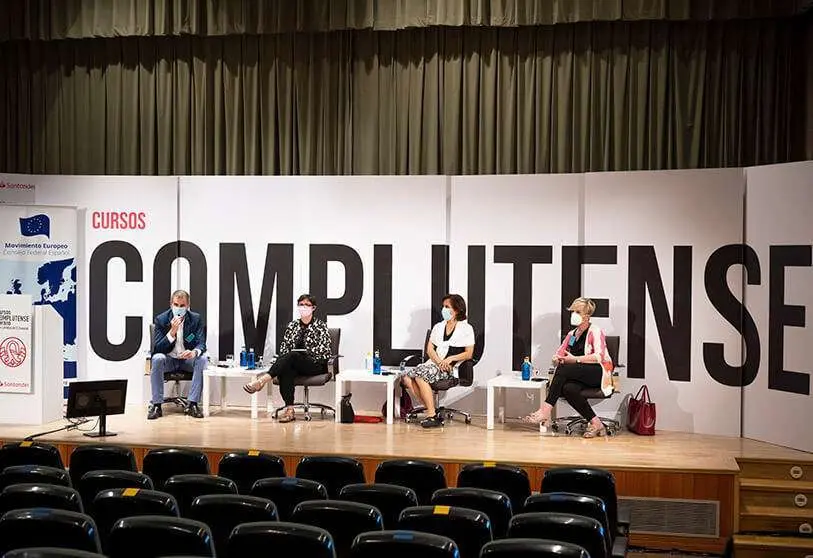Teresa Fajardo: "The EU is the great supporter of the Kyoto protocol that the US rejects"

In the second part of the second day of the course on 'Strengthening the international role of the European Union at the Conference on the Future of Europe', a new round table discussion was held, composed of the Professor of International Public Law and International Relations at the University of La Rioja, Mariola Urrea Corres, the Professor of International Relations at the University of Valencia, Pilar Pozo Serrano and the Professor of International Public Law, Teresa Fajardo del Castillo, which focused on the European Union between the United States and China in terms of the great challenges of our time: peace and security, international trade and climate change.
Mariola Urrea argued that it is necessary "to make Europe a true global actor, strengthening four areas: foreign policy, security and defence policy, and development policy (...) if we want to influence the world, we must have an impact with these proposals in these areas".

Otherwise, according to the academic, "we would be confusing the concept of strategic autonomy. The EU must aspire to strategic sovereignty, understanding it in this plurality of nuances, and preserve it". In this respect, strategic sovereignty would be "a very controversial concept because it will not be easily accepted by many EU states, but if the conference on the Future of Europe does not set any more limits on rethinking it, it would be worth working on it", he believes.
In this line, this concept "does not compromise the concept of openness of the EU, it strengthens the federal idea of the EU and that capacity for action, constituting an ambitious aspiration of the EU". It is here that the "concept of security appears, which is connected to the concept of human security that was born in the UN in the 1990s, and which looked after economic or health security, among many other manifestations".

On the other hand, Professor Pilar Pozo stressed that "the EU has to find a way to respond in accordance with the need to maintain its international position. The problem is to determine what its problem is, a strategic compass process has been set in motion, the EU's flagship initiative in security matters". This sort of compass "represents progress in a number of respects and these concrete advances would be extremely useful for the elaboration of an analysis of threats and risks in terms of intelligence because it is necessary to have an updated vision of the EU's shortcomings in facing these threats and risks".
In this way, he proposes that the EU should work to "respond to external conflicts and crises, to protect the Union and its citizens, although the Treaty of Lisbon incorporates mutual assistance and the idea of the defence of the Union's territory appears in the treaty, the truth is that this defensive action had not been enunciated within the specific objectives of security and defence by the Council".
In this sense, he proposes "to highlight that there are a series of threats that all member states indisputably perceive. It can be emphasised that the EU is committed to respecting international law and that there is a common heritage that is important to highlight (...) the EU has moved a long way in a short time, but in various directions without a single orientation, and political priorities must be set".

In this way, the European Union would be seen as "a provider in security matters, in which there is a strong and well-defined common security and defence policy".
Finally, Professor Teresa Fajardo addressed the problem of climate change "as a priority issue for decades". Environmental policies were presented as a triumph for the Union, since "it is committed to multilateralism and to positions adopted by the UN, since the EU's concern for the environment came from outside the UN when the Stockholm Conference took place".

"In the UN there is a seeding effect, as a normative power we want to propose objectives and priorities. We are the main champions on climate change, constant in our commitment to fight climate change," he added. "The EU is the main supporter of the Kyoto Protocol, which the US rejects, and it is the one behind the success of the Paris agreement, which was finally reached in 2015.
It is in this context that the term "EU climate diplomacy" emerges as a hallmark of Europe's identity, our roadmap towards a model that "puts the emphasis on national policy, protecting biodiversity, fighting climate change, because only when national policies are adopted can the objectives be achieved".

The academic argues that "exporting its regulatory model is exporting the multilateralism of the United Nations, but it also requires overcoming those elements that have proven to be inefficient". Along these lines, she explains the EU's loss of influence, given that "the European Union is no longer the main cause of the problem, and therefore suffers a loss of relevance".
In this sense, he advocates leading climate diplomacy through other instruments "beyond the ones it had". In this way, he affirms that "it has to enter the G20 and the G7, despite the weak power that has been attributed to it (...) The UK copies our regulatory model, which is a moral victory for the EU and a regulatory victory".
In conclusion, Fajardo said that in this new trajectory in which the European Union aspires to be able to take a new path, "I hope that coherence does not abandon us".










